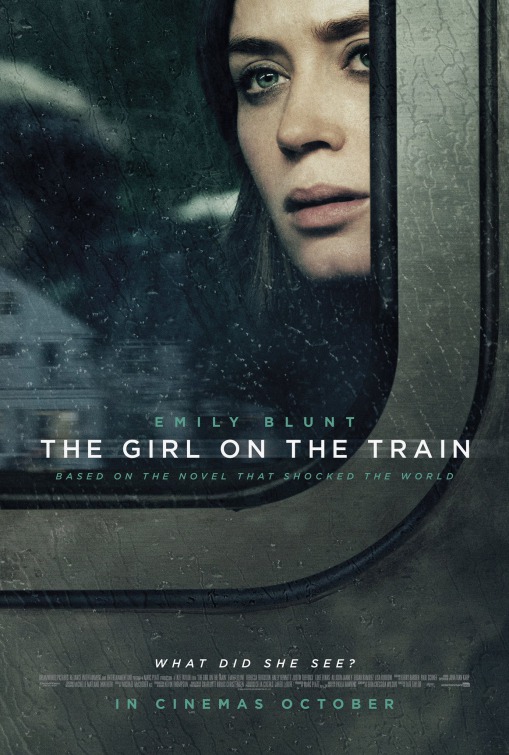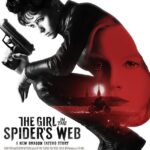What Did She See?
Director
Tate Taylor
Starring
Emily Blunt
Haley Bennett
Rebecca Ferguson
Justin Theroux
Luke Evans
Split between three female leads, the story of The Girl On The Train is a fractured tale of hazy recollection and deception. Rachel [Blunt] is a divorcee who commutes past her old residence every day via train. Each day she looks out the window and dreams up idyllic stories for those living in her old neighbourhood. One of the points of her fascination is Megan [Bennett] a young attractive woman with a seemingly perfect life. Megan is also the second of the narrative leads and we quickly learn that her life is far from perfect. She’s married but miserable, working as a nanny despite being an artist with work hanging in galleries and receiving regular therapy. Megan’s babysitting leads us neatly to the final narrative, which follows Anna [Ferguson], who lives in Rachel’s old house, having supplanted her due to an affair and is now married and has a daughter with Rachel’s ex-husband, Tom Watson [Theroux]. Events continually unfold and we learn that Rachel is in fact an alcoholic and believes she witnessed the events which led to Megan’s disappearance but can’t piece together anything solid. The narrative bounces back and forth, unveiling more and more details about these people’s respective pasts and how they are all linked.
The components involved in creating this film are a curiously assembled bunch. We have Tate Taylor in the director’s chair, whose most notable works are the much (some would say over) lauded The Help and the impressively performed James Brown biopic Get On Up. Behind the camera is the very talented Charlotte Bruus Christensen whose work on The Hunt alone merits her involvement in any prominent release. And scoring the whole thing is Danny Elfman, who has been drifting from project to project creating music of tempered subtlety, void of his usual characteristically bombastic themes; I have no idea if this is down to use of placeholder temp music or he’s simply trying to escape his trait trappings. Yet they harmonise together rather well, producing something that one wouldn’t necessarily attribute to any of them individually without first being aware of their presence. For the most part.
The overall premise is a decent one (after all the source material sold millions) but not one new to cinema. The concept that a series of supposedly unconnected characters’ lives can intertwine so powerfully is something explored regularly on film but I will admit this type of suburban drama has usually been relegated to hammy, over-acted TV movies; which is a shame because this subgenre has a lot to offer. The key factor dividing quality cinematic titles and 3am made-for-TV shite is the quality of the acting involved. Taking this into account, The Girl On The Train both excels and falters. The one thing I think every reviewer and audience member can agree on is that Emily Blunt’s performance was phenomenally good. Playing an alcoholic or someone in a state of inebriation is not easy; if anything it’s one of the hardest things for an actor to do. Somehow Blunt carries it wonderfully, giving us this really tender, broken performance which, coupled with the reveals in the story, make for a very complex and beautifully performed character. Unfortunately, that’s the only stable performance from start-to-finish, everyone else has a touch of absurdity which takes away from the overall performance. Many of the characters involved feel either underdeveloped or simply two dimensional. The clearest victim of this is the role of Anna, who seems to have a lot going on in her head that’s never really explored or explained. She’s out of work but needs a nanny to raise her child, she doesn’t trust her husband but won’t leave him, it’s almost as if there’s something terrible in her past (as with the other two leads) that is simply neglected, so we end up with this woman who behaves unconventionally without cause or reason.
And it’s not just the characters, a lot of the narrative threads feel horribly under-developed. One could argue this is fairly typical of any adaptation but without motivational justifications for actions or sufficient seeds planted throughout the story, certain developments, encounters and monologues feel like erratic pivots. Admittedly, this could be fallout from an element of the story that’s actually extremely praiseworthy: the unreliable narrator. Due to Rachel’s inability to remember key events and everyone else lying to one another, the story deliberately convolutes a very simplistic series of events, which both elevates and hinders the film.
The various subject matters of the plot – alcoholism, abuse, gas-lighting, marital affairs, pregnancy pressures – are all very important and arguably handled with reasonable care but in the end should have been vastly superior. Which really is one of this movie’s overarching flaws. The relentless thought encroaching on every frame of this film is the idea that everyone involved has achieved better results in the past. This isn’t to say that their best work is behind them, merely that by comparison what ended up on screen was far from their respective best. Leaving us with an entertaining but ultimately flat feature that starts a good conversation about presumptions and unhealthy domestic relations (which will, regrettably, instil a surprising amount of relatability) but doesn’t do much with it.
Release Date:
7th October 2016
The Scene To Look Out For:
Growing fearful of her own actions during the blackouts, Rachel attends an alcoholics anonymous meeting and confesses how terrified she is that she can’t piece together what took place during her lost time. The scene is pretty much a single camera pointed at Blunt with a few cutaways but it’s brilliantly acted and serves to highlight the strength of her performance.
Notable Characters:
The lead detective heading the investigation is Det. Sgt Riley played by the extremely talented Allison Janney.. who is completely underused in this film. On top of that, she seemingly exists above and beyond the story, disconnected from events. In fact, Riley doesn’t really react like a cop at all, more like a narrative device intentionally put in to coax the story – like a hallucinatory construct in Inception or Vanilla Sky – relying on leading questions, expositional reveals and massive breaches of police procedure. For a while I thought she might have been a figment of Rachel’s imagination but then I realised she just wasn’t very well written.
Highlighted Quote:
“You did nothing wrong. Nothing.”
In A Few Words:
“An acceptable thriller with some standout moments, developments and performances but overall extremely wanting”
Total Score: 2/5
![The Red Right Hand Movie Reviews [Matthew Stogdon]](https://reviews.theredrighthand.co.uk/wp-content/uploads/2021/12/cropped-header1.png)




